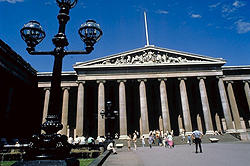 |
| Menu |
 |
| |
| |
 |
| British Museum, London |
 |
The British Museum was founded in 1753, when it was the first national, public and secular museum in the world. Its origins are inseparably linked with the name of Sir Hans Sloane (1660-1753), a court physician who collected a large number and a wide variety of antiquities of all sorts during his long life. His fantastic collection of 79,575 objects (not counting the herbarium and the library) were acquired for the nation with the proceeds of a public lottery.
The collections of scientific instruments are dispersed over the whole museum, but their core is kept in the Department of Medieval and Modern Europe, were they form part of the Horological collections. They comprise a wide variety of ?mathematical instruments? mainly of the 13th to the 18th centuries including some very early pieces such as the so-called ?Sloane astrolabe?, an English astrolabe of circa 1300 which was already in Sloane?s possession.
For Epact-related enquires, contact:
Dr Silke Ackermann,
Department of Medieval and Modern Europe,
The British Museum,
Great Russell Street,
London. WC1B 3DG,
U.K.
E-mail:
sackermann@british-museum.ac.uk
Tel: +44 [0]171 3238395
Web:
http://www.british-museum.ac.uk/
|
|


